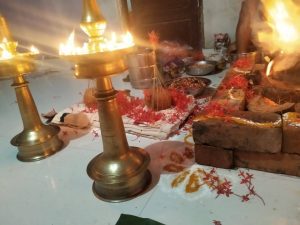The 'human sacrifice' in which two women were killed shows how many in Kerala are still in the thrall of regressive practices.

A black magic ritual being performed. (Wikimedia Commons)
In June 2019, a Christian woman approached a controversial spiritual centre offering miraculous healing at Kalavoor in Kerala’s Alappuzha district, seeking divine intervention to get her 27-year-old daughter married without delay.
The priests at the now infamous Kreupasanam Marian Retreat Centre and Socio-Cultural Centre had an easy solution: They advised the woman to buy old copies of the centre’s Malayalam weekly mouthpiece Kreupasanam by paying ₹2,000.
On their directions, she burnt the copies and mixed a portion of the ashes with dosa batter daily to provide her daughter “divine breakfast”.
When the daughter asked her about the bad taste, she claimed it was because of the poor quality of the oil.
It was only when the daughter was admitted to a local hospital with food poisoning that she revealed the truth to the doctors confronting her.
Once the doctors revealed the incident to the media, it caused a sensation across the state.
Subsequent probes revealed that the centre was engaged in the propagation of black magic and superstition. And burning the magazine and consuming the ash constituted the highest healing remedy it suggested.
The state’s largest popular science movement, the Kerala Sastra Sahitya Parishad (KSSP), approached the police and district administration seeking action against the centre for promoting regressive thoughts and practices.
In its complaint the KSSP mentioned several instances in which the priests advised ordinary people to burn the weekly magazine and consume its ashes to obtain miraculous solutions for their long-pending worries and anxieties.
But no police action has been initiated against the centre so far, and it even received state government funds to promote a traditional Christian art form of Kerala, Chavittunatakam, despite the government being aware of the allegations against it.
Recently, the weekly magazine — which often contains regressive content — courted controversy of a different kind when teachers of a government school at Pattanakkad advised students to keep the publication between their books and under their pillow as it would help them perform well in the annual examinations.
Though many parents complained to the Education Department about this, no remedial action was taken.

Kerala is now turning into a fertile ground for the ugly businesses of controversial faith healers, astrologers, black magicians and occult practitioners. (Supplied)
At Peringottukara near Thrissur in central Kerala, Sathru Samhara — elimination of the enemy — is big business.
Those who believe in black magic flock to the village from across India and even from overseas to appease the mythological demigod Chathan, or Kuttichathan, who is said to possess skills to finish off enemies.
Over a dozen establishments in the village practice Chathan Seva — a kind of black magic — to appease Kuttichathan, said to be a dark avatar of Vishnu who rides a buffalo.
Other than annihilating people, Chathan is famous for placing obstructions in the lives of the enemies of his devotees.
Chathan is also believed to be capable of blighting love-lives, improving business dealings and enhancing general prosperity.
In the Muslim-majority Malappuram district, a particular set of upper-caste Muslims — titled Thangals — controls the local black magic market and some obscurantist healing techniques.
Cutting across religions, people have maintained extreme faith in the Thangals, who are often likened to sorcerers.

From left: Muhammed Shafi alias Rashid, Bhagaval Singh, and his wife Laila, the three accused in the Kerala human sacrifice case. (Supplied)
The recent case of alleged human sacrifice in Pathanamthitta is a fresh wound on the psyche of a state that has been scarred by previous incidents of black magic, like the ones mentioned above.
Despite boasting of a highly literate and politically awakened populace, Kerala has a dark side that is mired in superstition and black magic.
A large number of people depend on “sorcerers” for “solutions” to their problems, and feel it is not wrong to pursue superstitions and supernatural beliefs.
The major crimes reported in recent years connected to superstition and black magic from the state make for a gory picture.
Hardly two years have gone by since a youngster in Thiruvananthapuram killed his parents and sister as part of the efforts to gain “supernatural powers” through Satan Worship, a kind of black magic.
Six months ago, a three-member family in self-imposed isolation in a posh neighbourhood of central Kerala was found dead under mysterious circumstances. The family used to conduct regular midnight rituals, and a suicide note recovered by the police contained their wish to hand over the family’s entire property to an astrologer who advised them on “spiritual matters”.
The suicide by a woman after burning her daughter to death in southern Kerala exposed how her husband and mother-in-law depended on superstition when the family was facing mounting debts due to accumulating arrears of a bank loan.
This mother and her son were told by a “human god” that some supernatural power would help them find money to repay the loan by helping to win a lottery.
Huge amounts were spent on lottery tickets. These tickets and recovery notices from the bank would often be used in black-magic rituals.
Unable to withstand the trauma, the woman and her daughter ended their lives.
There are several instances in which black magic rituals prompted families to starve their junior members and beat them severely to exorcise evil spirits.
In a 2008 incident, a Latin Catholic bishop in Kochi courted controversy by “sanctifying” his house using the menstrual blood of a 26-year-old woman. When it evoked large-scale outrage within the community, the Vatican removed him from the post.
According to psychiatrists, people who engage in obscurantist practices are hiding their true character and projecting an image that they are mature and socially responsible.
Consultant psychiatrist Arun B Nair opined that such people use their social acceptability as a mask to avoid social scrutiny of their illegal activities.
“Authentic studies are required on why Kerala society harbours a lot of superstition despite its radicalisation over the years by reformist movements and popular science organisations,” noted thinker and writer Sunil P Elayidom told South First.
“The state is home to many ‘human gods’, who claim to possess miraculous powers. Cutting across religions and social groups, black magic and superstition are prevailing across the state.” he added.
“See the classified advertisement section of any Malayalam daily newspaper. You can see numerous advertisements promising magical cures and miraculous healing. Godmen and women even release sponsored features to win followers. Charlatans are ruining the progressive fabric of the state,” writer and social observer S Saradakutty told South First.
Rationalist groups are accusing Left parties of diluting their core ideology and allowing such a situation to persist.
“For votes, the Left and secular forces refuse to annoy obscurantist and irrational groups. As a result, they make deep inroads in the state, winning over mentally weak and unstable persons,” said NM Arun, a Palakkad-based rationalist and social observer.
“Going by history, Kerala was under the grip of one of the harshest caste and religious systems in India for a long time. Social reform movements and progressive political ideologies spread renaissance values in the state in the last two centuries. But now, it seems the state is turning into a fertile ground for the ugly businesses of controversial faith healers, astrologers, black magicians, and occult practitioners,” said academic and social critic MN Karassery.
“To be honest, fraudulent and evil practices have no religion in the state. There are organised lobbies in the state exploiting people’s ignorance and their irrational beliefs,” he told South First.
According to him, education has failed miserably in keeping the sanity of Kerala.
“It’s wrong to assume that poor and uneducated people are falling victim to such practices. It’s a huge business, attracting both rich and poor, transcending faiths, castes, and communities,” he said.

Apr 19, 2024

Apr 19, 2024

Apr 19, 2024

Apr 19, 2024

Apr 19, 2024